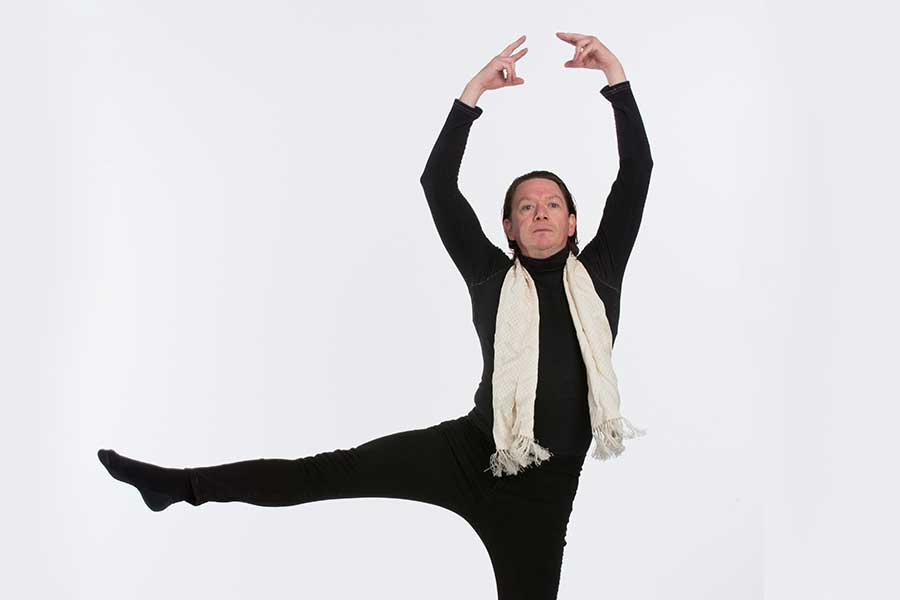A mainstay on Philadelphia stages, Keith Conallen is known for playing edgy, daring roles with independent theater companies such as Azuka, Theatre Exile and the now (sadly) defunct Flashpoint Theater Company. But Conallen’s zealous collaboration with the Wilma Theater and Blanka Zizka’s HotHouse ensemble has given him a spiritual home. He’ll tackle his latest role in the Wilma’s production of “Dance Nation” by Clare Barron, opening Oct. 22.
PGN: Do you think you have a signature — a tic, a move, a physical vibe — that directors and producers want?
KC: Directors need to construct the best combination of talent when producing a play, be that the designers, actors, crew, etc. When I’ve been cast, I believe it has been to serve that purpose. That being said, I too believe that as an actor I bring a sense of deep truth to a role and an ease in finding the breath required to give birth to a character. All that takes a great amount of training and experience, and with my continuing work in the Wilma HotHouse acting company, my natural ability and talent keeps getting stronger.
PGN: What roles do you like best?
KC: I was having a conversation with a cast-mate about the phases one has throughout their career. If you start off young, fresh out of college, you find yourself cast in ingenue/sensitive young man roles. At a certain point you transition into a more mature sort and then further into husbands and dads. Of course this is how you are seen. You cannot deny age. I currently find myself in this latter phase. I’m not saying that these are the only roles out there, certainly not. I have been very fortunate to encounter some really interesting personas, especially through my work at the Wilma. This season, as with many in the past, has me playing comedy and absurdity, over-the-top drama, camp, powerful and quiet contemplation — the possibilities are endless and they all deserve a chance to be heard. This is what interests me. Shout out to Exile and Azuka for giving me some drippingly delicious characters to work on.
PGN: How do you feel about HotHouse?
KC: I’ve always been a fan of what the Wilma has produced. I was one of the many first participants as we began to build our pedagogy. Blanka had seen me in a few shows around town and saw something in me. I’m so glad she did, as the experiences I’ve had with her and the company have pushed me leaps and bounds to be better, stronger. My favorite element of the HotHouse is that no one is held to a type or vibe. We all have the chance to explore roles and personalities. These are the possibilities that deserve to be heard. Our work is truly expansive.
PGN: Clare Barron’s physical comedy “Dance Nation” is woman-centered. How do you work within that as a man?
KC: Justin Jain, the other male-identifying cast member, and I have a few advantages here. We hold a great deal of respect for these women. They are collaborators, yes, but also friends and family. Sisters. As gay men, I think that there is a strong sense of support and care that we feel for them. For many of us, when coming out, a girl was the one person who didn’t treat us like garbage while figuring out who we were, our fragile pubescent brains processing all of those confusing emotions. Thank god for our best friends taking care of us. Now we do the same for them.
PGN: How would you say that “Dance Nation” is a different play for the Wilma? It feels broader. And what does the author mean by calling it a “ghost play”?
KC: It’s an interesting idea to think of the Wilma, and any theater really, disregarding whatever a mission statement says, as having a particular brand. Our work runs the gamut of story and feeling. If I had to, I’d say “Dance Nation” fits perfectly into the Wilma brand. As we as a company progress into the future, our skill set continues to grow, and so the work we can tackle begins to expand. Our “brand” is “living, adventurous art.” “Dance Nation” is living. It is adventurous. It is art. You ask about it being a “ghost play.” There are moments that we catch a brief glimpse into the girls’ future selves. I believe these glimpses give us that feeling of being among ghosts.
PGN: Who are you in “Dance Nation”? How do you make this role singularly yours?
KC: I play Dance Teacher Pat, owner and choreographer of the studio the children compete for. Pat is a strict taskmaster, demanding the best, but ultimately he does care a great deal for these kids. He’s a dancer himself and knows what it takes to be the best. I personally have no formal dance training, so I have no model to work from. I basically do for this role what I always do, really, and bring the most amount of honesty and humanism I can. Also, I asked for a cane like the great Debbie Allen uses in “Fame.” I’ll be keeping that.
